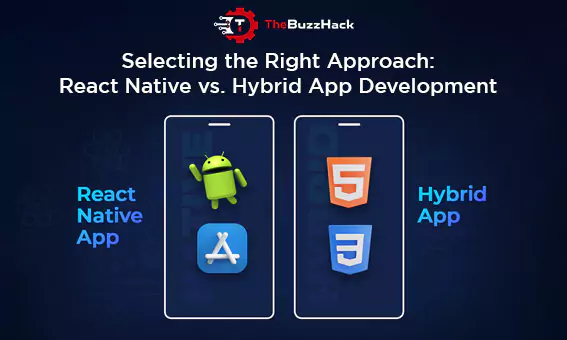
Selecting the Right Approach: React Native vs. Hybrid App Development
Are you in the process of selecting the ideal application development framework but feeling uncertain about whether to opt for React Native or Hybrid development? In this blog post, we explore key considerations that both startups and established companies can leverage to make the right choice for their application development needs.
As we venture into the world of mobile application development for organizations and businesses, it becomes evident that choosing the right development approach is essential. This approach should facilitate a swift market entry, ensure high-quality results, and remain budget-friendly. Hybrid App Development offers various advantages, such as a comprehensive approach to a wider audience on multiple platforms, the option to create offline versions of mobile applications, and a reduced demand for advanced graphics performance compared to native applications.
Let’s delve deeper to find the most suitable method for mobile application development.
What are React Native and Hybrid app development?
React Native, introduced by Facebook in 2015, is a framework designed for the efficient development of native-style mobile applications. React Native applications can be developed quickly and cost-effectively, as they use a common programming language, JavaScript, for both Android and iOS development.
In contrast to this, native applications are limited to either iOS or Android. This is why many businesses, particularly startups, are choosing Hybrid app development. React Native offers a versatile solution for cost-effective, quick-launch application development that caters to popular platforms like Android and iOS.
Let’s explore Hybrid application development, including its disadvantages:
- Poor Performance: Hybrid applications often exhibit subpar performance compared to React Native applications. This performance gap can be attributed to an additional layer between the source code and the target mobile app platform.
- Complex Debugging: The added layer in hybrid app development makes debugging a challenging task. Developers may become reliant on the framework, which can prevent them from addressing new bugs efficiently during the development process.
- User Management Issues: Testing hybrid applications can result in difficulties related to user account creation and sign-in processes. The lack of performance metrics to assess application performance can lead to issues like multiple sign-in screen displays and high bounce rates for users.
- Limited High-Quality Graphics: Adding high-quality 3D graphics can be problematic in hybrid development, often requiring extra efforts to bridge the gap and meet the application’s graphical requirements. Developers may resort to third-party tools to fulfill unique client demands.
- Adding Features: Incorporating new features to provide an easy and personalized experience for modern users can be challenging with hybrid development. Incomplete functionalities may lead to a disconnect with customers.
Native applications emerge as a top solution for businesses seeking the best-fitting application for their needs. Below, we explain how React Native application development surpasses hybrid development, outlining the reasons startups opt for React Native in their mobile application development journey.
Why React Native Application Development?
Discover the key factors that make React Native application development the optimal choice for businesses of all sizes seeking to build their mobile applications:
- Cross-Platform Compatibility: React Native allows developers to write code once and deploy it on both iOS and Android platforms. This cross-platform capability significantly reduces development time and costs compared to building separate native apps.
- Code Reusability: React Native promotes code reusability, enabling a significant portion of the codebase to be shared across platforms, accelerating development and simplifying maintenance.
- JavaScript Framework: Built on React, a widely-used JavaScript library for creating user interfaces, React Native leverages the familiarity of JavaScript, facilitating developer adoption.
- Performance: React Native achieves high-performance levels by using native components and optimizing specific parts of the application for each platform, making it suitable for most applications.
- Hot Reloading: React Native’s “hot reloading” feature allows developers to see code changes in real-time, enhancing the development process’s speed and efficiency.
- Community and Ecosystem: React Native boasts a vibrant community and a rich ecosystem of third-party libraries, plugins, and tools, simplifying development and addressing common challenges.
- UI-Focused Development: React Native’s component-based architecture simplifies the creation of complex, modular, and maintainable user interfaces.
- Supported by Facebook: Facebook’s active maintenance and development of React Native since its 2015 launch instill confidence in its long-term viability and continuous improvement.
- Time-to-Market: React Native’s code-sharing capability and rapid development cycle expedite time-to-market for mobile applications, a crucial advantage in the fast-paced tech industry.
- Ease of Maintenance: Maintaining and updating a single codebase for multiple platforms streamlines ongoing support, reducing resource and effort requirements.
In conclusion, while React Native offers numerous advantages, it’s crucial to consider the specific needs of your project, your team’s expertise, and the nature of the application under development. However, its popularity and widespread adoption within the mobile app development community underscore its value and benefits. On the other hand, hybrid app development may not suit every business seeking the most effective solution for their unique requirements.
Read More: Uncovering the Primary Benefits of Ruby on Rails in Web Development


